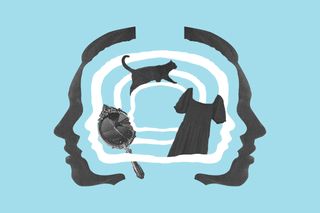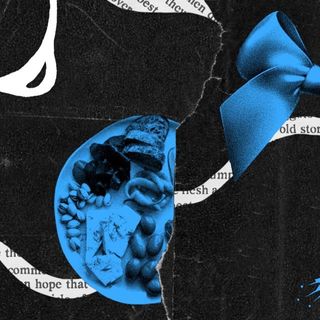
Many Indians Grow Up With Superstitious Families. A Lifetime of Anxiety, Self‑Blame Follows.
Internalizing superstitious beliefs our formative years can lead us to blame ourselves when things go wrong.

“Why do you want your marriage to be doomed?” I was asked by a relative, for daring to wear a black jumpsuit to my court wedding. Seemingly, I’d opened a floodgate of disapproving remarks from relatives and family members, who berated me, saying: “It invites bad luck, don’t you know?”
Superstitions — those irrational beliefs, rooted in ancient traditions, folklore, and religious teachings, that defy logic and reason — have been a part of human culture for centuries. While some may find them amusing, or dismiss them as mere quirks, the impact of growing up in superstitious households is, often, far-reaching and profound.
Even though wearing black was part of my broader — and deeply deliberate — decision to distance myself from the norms surrounding marriage, I couldn’t help but worry that I had stupidly challenged fate. Growing up around superstitious family members meant that I’d internalized a significant chunk of their belief systems — from avoiding a path crossed by black cats to retracting my steps if I happened to sneeze on my way out. Despite attempting to challenge these unfounded fears that I refused to carry forward, I struggle to come to terms with the fact that I, as an individual, am not responsible for every misfortune that befalls me.
Superstitions often create a heightened sense of responsibility for events beyond an individual’s control, with the undue burden contributing to elevated levels of anxiety about one’s actions.
Related on The Swaddle:
Indian Adults Are Leading ‘Double Lives’ to Avoid Controlling Parents. But What’s the Hidden Cost?
A 2016 article by the American Psychological Association notes that even though most people are aware that their superstitious beliefs have no basis in reality, they still struggle to overcome these ideas — leading to cognitive dissonance between people’s rational selves and the superstitions ingrained in their minds.
Labeling this experience as a “neurotic paradox,” Eric Storch, a clinical psychologist, explains how superstitions are self-perpetuating: When one engages in superstitious behavior to avoid a certain outcome, their belief in the superstition is strengthened when that outcome doesn’t occur. “You think it works, so the behavior persists. That’s one of the reasons you see these behaviors continue for a lot of people. They see a truth to it because the feared outcomes didn’t take place.” Concurring research adds that the persistence of superstitions can indeed be “ascribed to the placebo effect that yields an increased sense of control and mental reassurance in unpredictable [circumstances].”
The inability to let go can also result from the pervasive and pernicious sense of self-blame that accompanies superstitions — prompting people to attribute unfavorable circumstances in their lives to their own lapses in following superstitions. V., a disabled individual, recounts his experience of being parented by a superstitious mother. “She put me through horrible fasting, literal emotional abuse, and made me get involved in superstitious affairs — all in order to ‘cure’ my disability.” Growing up, he was religious, too. Eventually, his beliefs evolved to be agnostic. But still, “[I]t causes me anxiety even today, and I worry that if I do anything against what I previously used to do, something bad might happen.”
Indeed, superstitions can, on occasion, be harmless. But when they perpetuate harmful stereotypes and prejudices through, for example, restricting the movements of menstruating individuals, not sharing utensils with people from certain castes, and believing people with health conditions, like albinism, to be evil, they can quickly become both discriminatory and dangerous.
Related on The Swaddle:
How Making Fun of Cultural Stereotypes Keeps People From Bonding With Their Communities
Superstitious beliefs can also become debilitating for the individuals practicing them — especially if they’re inflexible in their adherence to the belief, and feel so compelled to perform rituals that any divergence spells an all-consuming sense of distress. Citing the example of someone who might perform a ritual for just 15 minutes every day, Storch says that, prima facie, it might not seem like a big deal. “[B]ut on the other hand, that’s two hours a week, eight hours a month, a day every quarter… That’s a four-day trip somewhere awesome.”
Interestingly, being a part of circles that regard logic and ridicule superstitions — or, basically, any notion that isn’t grounded in empirical evidence or rationality — makes many individuals feel compelled to distance themselves from the beliefs they were indoctrinated with, to avoid judgment or mockery. At first glance, the acute stigma that superstitions carry in modern societies, then, can seem liberating. And to a certain extent, they probably are, too.However, that doesn’t mean that the ridicule can always, without fail, exorcise the haunting effects of growing up in superstitious families. A., who grew up around a “super ‘religious’ a.k.a. ‘superstitious’ grandmother,” says she “can never make 10 of any food item ever; it has to be nine or 11 because 10 is made to serve the dead.” She was also told how standing on one leg will make her lose a parent, and sitting on a pillow would make her incur financial losses.
And so, some may assert their non-superstitious stance publicly; privately, however, they may continue to harbor superstitions — hating themselves, in the process, but unable to resolve the conflict between their rational self and the belief systems they were exposed to for years. “I feel a fair bit of annoyance at myself for worrying about such nonsense,” A. says. Yet, drilled into her head during her formative years, the superstitions continue to haunt her, at times. “I was more gullible and naive, as a child, and it made more of an impact on me. Now, if I’m told something new, it’s easier to rubbish it.”
The anxiety and self-blame associated with superstitions can persist throughout a person’s life, and — with breaking free isseeming like a slow, gradual process. And while we might not be able to overcome every superstition we were conditioned to believe in, persistently questioning them, fostering self-awareness, and engaging in critical thinking might be the onlya good way forward. And, as A. noted, it helps to dismiss the new superstitions that come our way, at least.
Devrupa Rakshit is an Associate Editor at The Swaddle. She is a lawyer by education, a poet by accident, a painter by shaukh, and autistic by birth. You can find her on Instagram @devruparakshit.
Related

.jpg?rect=0,80,1280,1280&w=320&h=320&fit=min&auto=format)
Woe Is Me! “I’m in Love With My Cousin Brother. Can We Ever Be Together?”
